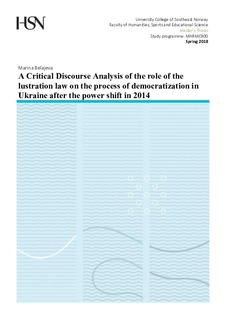A Critical Discourse Analysis of the role of the lustration law on the process of democratization in Ukraine after the power shift in 2014
Master thesis
Permanent lenke
http://hdl.handle.net/11250/2560990Utgivelsesdato
2018Metadata
Vis full innførselSamlinger
Sammendrag
The 2013 – 2014 Ukrainian revolution, which started as a non-violent demonstration for European integration, rapidly developed into a riot against corrupt government officials, human rights violations and power usurpation, which resulted in mass killings and full-scale war in the Eastern part of the country, which has escalated into prolonged conflict. One of the claims of the Euromaidan supporters was for the protection and cleansing from state institutions of corrupt high-ranking officials from the previous regimes through the ‘special, transitional public employment laws’ (David, 2015) referred to as lustration laws. The objective of this study is to conduct a critical discourse analysis of the lustration policies implemented in post-Euromaidan Ukraine in 2014 through the prism of transitional justice (TJ) literature and in light of the experiences of other CEE countries. A further objective is to explore the impact of the Ukrainian lustration law on the process of democratization in the country. Fairclough’s three-dimensional model is applied to one legal document in the form of the Ukrainian Law ‘On Government Cleansing’ and two non-legal documents in the form of newspaper articles in order to see what discourses prevail in the texts in the context of democratization and what social effects they might have
